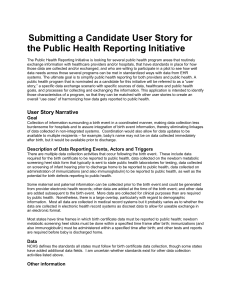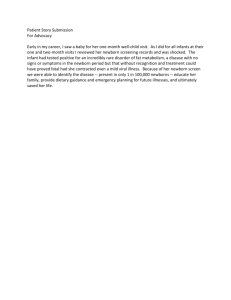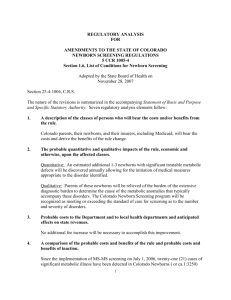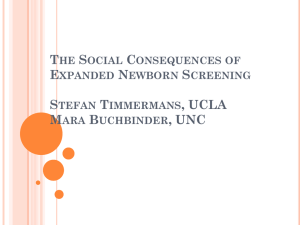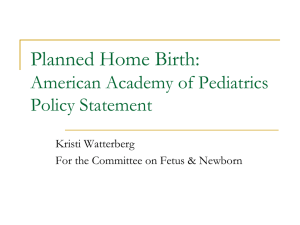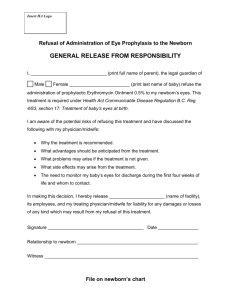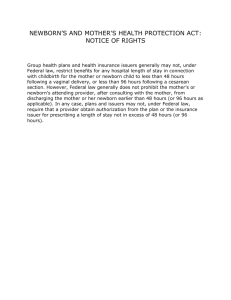Metabolic/Sickle Cell Guidelines
advertisement
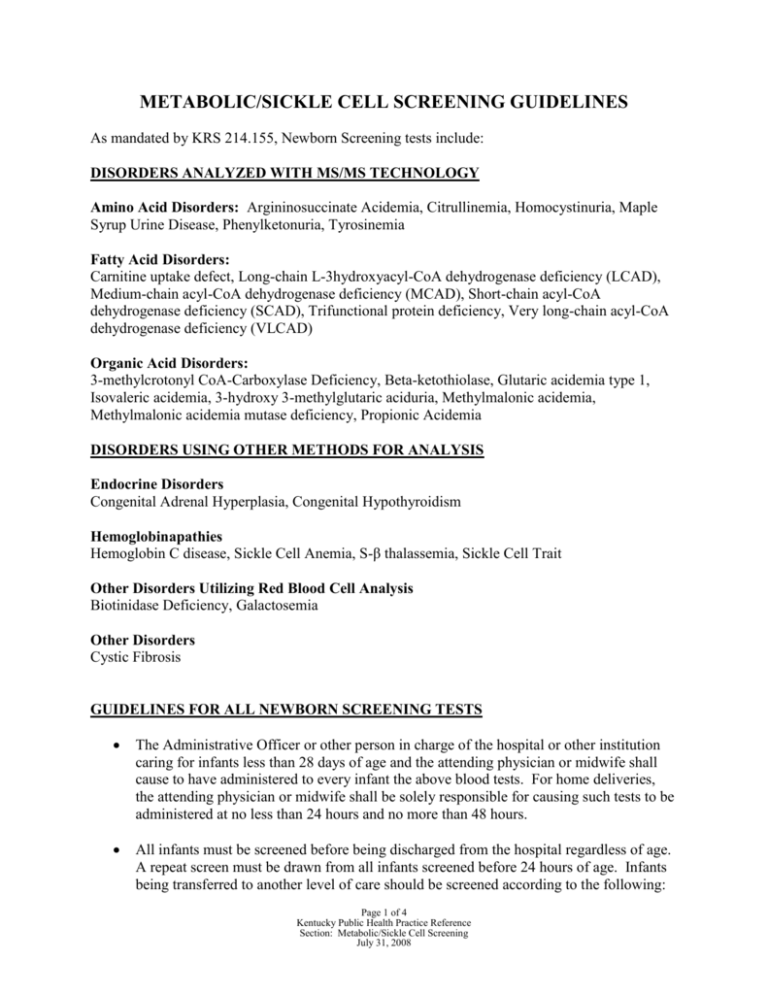
METABOLIC/SICKLE CELL SCREENING GUIDELINES As mandated by KRS 214.155, Newborn Screening tests include: DISORDERS ANALYZED WITH MS/MS TECHNOLOGY Amino Acid Disorders: Argininosuccinate Acidemia, Citrullinemia, Homocystinuria, Maple Syrup Urine Disease, Phenylketonuria, Tyrosinemia Fatty Acid Disorders: Carnitine uptake defect, Long-chain L-3hydroxyacyl-CoA dehydrogenase deficiency (LCAD), Medium-chain acyl-CoA dehydrogenase deficiency (MCAD), Short-chain acyl-CoA dehydrogenase deficiency (SCAD), Trifunctional protein deficiency, Very long-chain acyl-CoA dehydrogenase deficiency (VLCAD) Organic Acid Disorders: 3-methylcrotonyl CoA-Carboxylase Deficiency, Beta-ketothiolase, Glutaric acidemia type 1, Isovaleric acidemia, 3-hydroxy 3-methylglutaric aciduria, Methylmalonic acidemia, Methylmalonic acidemia mutase deficiency, Propionic Acidemia DISORDERS USING OTHER METHODS FOR ANALYSIS Endocrine Disorders Congenital Adrenal Hyperplasia, Congenital Hypothyroidism Hemoglobinapathies Hemoglobin C disease, Sickle Cell Anemia, S-β thalassemia, Sickle Cell Trait Other Disorders Utilizing Red Blood Cell Analysis Biotinidase Deficiency, Galactosemia Other Disorders Cystic Fibrosis GUIDELINES FOR ALL NEWBORN SCREENING TESTS The Administrative Officer or other person in charge of the hospital or other institution caring for infants less than 28 days of age and the attending physician or midwife shall cause to have administered to every infant the above blood tests. For home deliveries, the attending physician or midwife shall be solely responsible for causing such tests to be administered at no less than 24 hours and no more than 48 hours. All infants must be screened before being discharged from the hospital regardless of age. A repeat screen must be drawn from all infants screened before 24 hours of age. Infants being transferred to another level of care should be screened according to the following: Page 1 of 4 Kentucky Public Health Practice Reference Section: Metabolic/Sickle Cell Screening July 31, 2008 The transferring hospital is responsible for screening if the infant is greater than 24 hours of life. The receiving hospital is responsible for the screen if the infant is less than 24 hours old. Other reasons for repeats include unsatisfactory specimens, transfusions, or receiving parenteral feeding. When infants have positive test results, treatment services are available at the two university medical centers through an arrangement made with the Division of Adult and Child Health Improvement. Screening occurs in a LHD when: A laboratory, hospital, physician of record, or parent requests the newborn screening. An infant has not received the screen as a result of home delivery, early hospital discharge (release less than 24 hours) or other circumstance. Any or All Test Results * Unsatisfactory, Abnormal, Needs Further Testing or Normal But Transfused Results Repeat Laboratory test as needed or upon request Positive NBS follow-up staff will request immediate referral to university specialist for diagnostic evaluation Negative No action needed Sickle Cell Trait (see table for “Laboratory Results for Sickle Cell Screening” in Laboratory Section of PHPR) Hemoglobin electrophoresis to be drawn at 6 months of age by PCP or hematology specialist *Letters requesting repeat tests are generated by the newborn screening laboratory follow-up system. These letters are sent to the infant’s health caregiver/submitter (physician, hospital, primary care provider or LHD). If a repeat newborn screening test has been requested and not received, the newborn screening follow-up staff will send a letter to the infant’s mother or guardian notifying them of the continued need for repeat testing. Page 2 of 4 Kentucky Public Health Practice Reference Section: Metabolic/Sickle Cell Screening July 31, 2008 LHD ROLE IN FOLLOW-UP OF NEWBORN SCREENS The LHD may need to perform a newborn screen on an infant if a repeat has been requested. Notification from the State Lab or the Newborn Screening Program shall be presented at the time of the request. If the status of a newborn screening result is in question, LHD staff shall contact the State Newborn Screening Lab to inquire as to those results before initiating another test. The LHD may be asked to assist in locating the patient. All infants with a positive result on the newborn screening test shall be evaluated for WIC eligibility. As of July 15, 2000, all health benefit plans that provide prescription drug coverage shall provide for the coverage of amino acid modified preparations and low protein modified food products for the treatment of inherited metabolic diseases (as stipulated by law) if the products are prescribed for treatment and administered under the direction of a physician. The Division of Adult and Child Health Improvement may provide special foods and formula for the same conditions to these persons who are uninsured or with the same requirements, that the products are prescribed for treatment and administered under the direction of a physician. GUIDELINES FOR SICKLE CELL SCREENINGS (and any other tests utilizing the filter paper card) FOR PERSONS OVER SIX (6) MONTHS OF AGE The State Lab does not accept filter paper newborn screening specimens on patient over six (6) months of age unless they fall under one or both categories: Prematurity Adoption For anyone older than six (6) months of age that does not fit the above criteria, blood testing will need to be performed in the PCP’s office to ensure accurate results based on age and weight guidelines. Page 3 of 4 Kentucky Public Health Practice Reference Section: Metabolic/Sickle Cell Screening July 31, 2008 POSITIVE DIAGNOSIS The State Newborn Screening Coordinator will refer to one of the two university medical centers. The LHD may be asked to assist in locating the patient. All MS/MS Congenital Galactosemia Sickle Cell Disease Disorders Hypothyroidism Assess for WIC Assess for WIC Assess for WIC Assess for WIC eligibility. eligibility. eligibility. eligibility. Request plan of care from If not eligible No action Assist family in pediatric hematologist at for WIC, assist required by obtaining soy University of Kentucky or the patient/ LHD. formula. University of Louisville if the family with patient is being followed by the obtaining LHD. The follow-up dietary formula should be done or foods upon by the primary Counsel parent and patient on request. * care provider. febrile conditions and other indicators for emergency follow Provide follow up treatment to confirm up blood information provided by monitoring university metabolic staff. upon PCP’s order. May monitor compliance with prophylactic penicillin, if Consult with requested. the school lunch program Assess, counsel and refer (if upon request of needed) for nutritional needs school and fluid consumption. nutritionist. Determine whether genetic counseling has been provided by university and make referral to genetic clinic if indicated. *As of July 15, 2000, all health benefit plans that provide prescription drug coverage shall provide for the coverage of amino acid modified preparations and low protein modified food products for the treatment of inherited metabolic diseases (as stipulated by law) if the products are prescribed for treatment and administered under the direction of a physician. The Division of Adult and Child Health Improvement may provide special foods and formula for the same conditions to these persons who are uninsured or with the same requirements, that the products are prescribed for treatment and administered under the direction of a physician. Page 4 of 4 Kentucky Public Health Practice Reference Section: Metabolic/Sickle Cell Screening July 31, 2008
